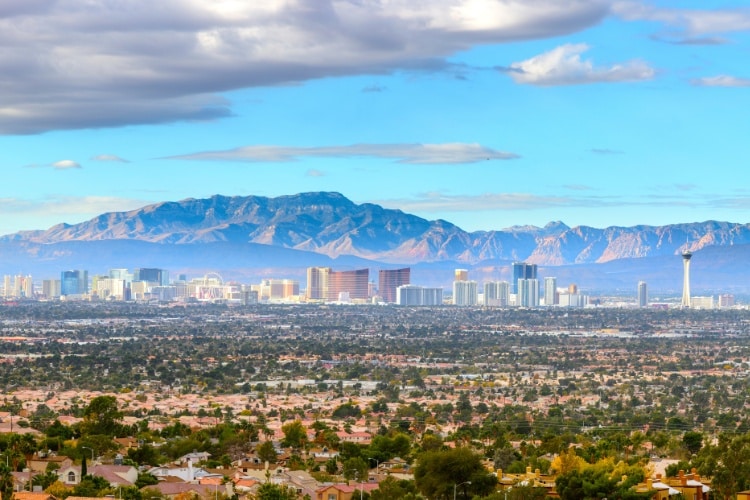Average Closing Costs in Las Vegas (2024 Guide)
Trying to predict how much money you stand to lose based on the average closing costs in Las Vegas?
Understandable. As there are many costs that can begin to take a toll on your profits and future investments.
Expected closing costs include loan origination fees, escrow fees, title search, title insurance, and real estate transfer tax. Understanding these fees and how much they’ll cost you is essential.
We know it can be complicated, so we put together a comprehensive guide that uncovers all the significant closing costs you can expect to pay as the seller and the buyer.
Las Vegas Mortgage Related Cost Breakdown
The average home buyer or seller isn’t typically well-versed in the language of mortgages.
Unless you work in the industry, the different costs can become overwhelming. It may seem like the long list of fees and expenses can be never-ending.

Calculating closing costs yourself tends to be a little overwhelming.
But if you’re aware of these costs and understand where your money is going, it can make acquiring a mortgage and purchasing a home much more manageable.
It’s important to note that with any mortgage, the closing costs can amount to several thousand dollars, and it’s essential to budget for these fees that you will encounter.
Here’s a breakdown of some of the most common mortgage-related costs you will see when purchasing or selling a home in Las Vegas.
Loan Origination Fee
When purchasing a home, most home buyers will need to apply for a mortgage. If you require a mortgage, then you will need to work with a lender who can establish the loan. This may be an excellent time to find the best mortgage rates or work with a broker who can find you the best interest rate.
The loan origination fee is the cost of establishing a loan with a bank, broker, or other loan agent handling the processing of the loan. You should expect to pay a fee of between 0.5% to 1% of the loan.
Credit Report Fee
Before you’re approved for a mortgage, you will need to prove that you are a responsible borrower. If you have a low FICO score, you will likely have to pay higher fees on your mortgage.
Once you’ve engaged with a lender, they will pull your credit report to ensure you have the capacity to pay the loan, understand your debt-to-income ratio, and this will help them see how you manage debts.
There is a cost associated with pulling your credit report, and the mortgage lender will expect you to pay this fee regardless of your approval for the loan. Typically the price to pull your credit report is under $30, but depending on your mortgage lender, the cost could be higher.
Private Mortgage Insurance
Private mortgage insurance (PMI) is insurance that protects the bank or lender in a case where you default on your mortgage.
The state of Nevada requires PMI on conventional loans where the loan to value (LTV) is more than 80% of the home’s original price or appraised value. In layman’s terms, if you put down less than 20% on the mortgage, the lender will require you to pay a PMI. This cost will be included in the monthly mortgage payments.
PMI can range depending on factors like credit score, loan amount, and downpayment percentage. For example, you can expect to pay between 0.25 percent and 2.25 percent of your loan per year for the lifetime of your loan.
Attorney Fees
Nevada doesn’t require you to have a real estate lawyer to close on a home.
You may decide that you’d like to hire an attorney to help with the legal aspects of closing a home. An estate lawyer can help you with reviewing documents related to the purchasing agreement, mortgage documents, title documents, and transfer documents. A real estate attorney may also provide legal representation for a buyer or seller when a dispute arises in a courtroom.
Your realtor may also suggest hiring an attorney if the closing is complex, purchasing a foreclosed home, or the home is damaged.
If you decide to hire an attorney to help you purchase or sell, you can expect to pay between $350 and $500 per hour.
Escrow Fees
Before we outline what escrow fees are, we should first define escrow and how it works when purchasing a home. According to Investopedia, escrow is “a neutral third party holding assets or funds before they are transferred from one party in a transaction to another.”
Essentially, buyers in Nevada will encounter an escrow company and title company who will help you ensure you close on time and that there aren’t any delays due to financial issues.
The title company will first set up an escrow account where the funds are held. This can include your earnest money deposit and payment for property taxes, insurance policies, and other services. When you engage in this service, the seller will not receive any of the funds until all conditions of the purchasing agreement are met.
The title company will help you go through all the steps required to meet the conditions you will need to complete before closing. In Nevada, it’s customary for the buyer and seller to split escrow costs.
Las Vegas Property Related Cost Breakdown
When making an offer on a home, it is customary to have certain conditions in place to protect your investment. These conditions usually include a title search, title insurance, appraisal, and home inspection.

In Nevada, the seller is required to pay a Real Estate Transfer Tax.
These fees are typically paid by the buyer and are used to ensure that the property is free of any liens or encumbrances, that the property’s value has been adequately assessed, and that there are no hidden defects that could potentially cost a significant amount of money to repair.
Although these conditions may seem like an extra expense, they are generally worth the peace of mind that comes with knowing that you are buying a sound investment.
In addition, the closing can include property-related fees that won’t be a part of the conditions of a home. It’s essential that you’re prepared for these costs as they may appear unexpectedly or may be fees you weren’t aware existed in the home-buying process.
Title Search and Title Insurance
This can be one of the most important aspects of purchasing a home. You’ll want to have successfully conducted a thorough title search with a title abstractor who can identify that the seller has the right to sell you their home.
In addition, the title abstractor will work to ensure the land you’re buying has no outstanding ownership disputes, unpaid taxes, judgments, or lawsuits.
Once the title search is complete, you will want to be protected with title insurance in a case where the title abstractor misses something in the title search. This protects both parties if something was overlooked and there are claims on the property or “title defects” that were missed.
In Nevada, it’s standard for the buyer to pay for the lender’s title insurance and the seller to pay the owner’s policy.
Title insurance is only paid once at closing and cannot be transferred to the next buyer. So if you decide to resell the home immediately, The seller cannot transfer the insurance to the new buyer.
Appraisal Fee
Once you have been pre-approved on a home loan and have made an offer on a new home, it’s advisable to have a condition on financing.
Lenders will want to appraise the home to ensure the offer is fair market value. A lender will perform an appraisal on a home so they can feel secure should you default on the mortgage that they can recoup the money they lent you based on the home value.
The appraiser will evaluate your home, lot size, features, conditions, and how it compares to other homes in the neighborhood. In addition, they will look at recent home sale prices, nearby amenities, the desirability of the location, and market trends to determine a fair market value for the home.
The lender will be the one to organize the appraisal, but it’s customary for the buyer to pay for this service. The appraisal cost will be between $250 and $400.
Home Inspection Fees
A home inspection is one of the most crucial parts of purchasing a home.
Where a title abstractor will determine that there are no legal issues with the property, and an appraiser determines the home’s value, the home inspector will determine that the house is free of any significant damage, structural, foundation, roof, electrical, and insulation issues. The home inspector will thoroughly examine the home and provide you with a detailed document.
It’s crucial you pay attention to what the home inspector finds. Some issues may be minor, whereas others can have significant financial implications later on. You can also use this report to negotiate your offer or that the seller makes any home repairs before the purchase.
After the home inspector provides you with the report, if you decide that the home’s faults are beyond what you can handle, the seller may have a contingency on the offer that you must provide them with the home inspection you paid for.
Real Estate Transfer Tax
In Nevada, when a property is transferred from one person to another, you’re required to pay the Real Property Transfer Tax.
The state of Nevada’s Tax website explains transfer tax as “a special tax called the Real Property Transfer Tax is imposed. The County Recorder in the county where the property is located is the agency responsible for the imposition and collection of the tax at the time the transfer is recorded. When all taxes and recording fees required are paid, the deed is recorded.”
Both parties are responsible for paying their share of this tax before the property is transferred to the new owner.
Real Estate Agent Commission
Each party typically has its own realtor when buying or selling a home. However, there are times when a realtor may represent both parties. When there are two realtors, the commission is split, and when a realtor does a double-ended deal, they receive the total amount.
The standard real estate agent commission is around 6% but can be much less depending on your realtor, the buyer’s agent, how you sell your home, and if the realtor is willing to take less commission to make the sale.
In any case, the real estate agent’s commission payment falls onto the home’s seller. The commissions are taken out of the home’s sale price; typically, the escrow company will manage this payment to the brokerage.
Las Vegas New Home Owner Cost Breakdown
If you’re a first-time homeowner, there may be a few surprise costs that you may not have been aware of, especially if you’ve been renting or living at home.
Even seasoned homeowners who have purchased a home in the past may be surprised by the influx of new fees, which are typically assessed within the first few weeks of owning a new home.

Rolled into your standard upfront closing fees are yearly prepaid costs.
These three expenses will need to be prepaid, which means you will need to pay for them at closing. The fees cannot be added to your home financing and will need to be paid up-front once you have possession of the home.
Property Taxes
Property taxes have many variables, from your home’s value to your lot’s square footage and location.
However, Nevada has one of the lowest property taxes in the country because homeowners are protected from steep property tax increases by Nevada’s property tax abatement law that limits annual property tax bill hikes to a maximum of 3% across the state.
The median annual property tax in Nevada is $1,614. In Las Vegas, the estimated annual property tax rates can be calculated at roughly .5% to .75% of the home purchase price.
Homeowner’s Insurance
Homeowners insurance is a type of policy that covers your property in case something happens. If you buy the right kind, it will help protect what’s on your land from damage or loss due to accidents like fires and natural disasters like earthquakes and wildfires, as well as help fund repairs if any damages occur while covered by this coverage.
A common misconception about home-insurance providers is they’re only concerned with protecting things near an actual structure, but many also offer protection against theft (including jewelry) and liability claims arising.
Nevada law requires that all homeowners have some form of homeowner’s insurance, so once your home closes, you will need to find the right policy. The average cost of homeowners insurance in Nevada is $1,144 per year or $95 per month.
Since it will be part of closing costs, you will need to pay for the entire year at closing.
HOA Fees
If the home you purchase is part of an HOA, you will need to pay for the next year once your home closes.
About 57% of homes in Nevada fall into an HOA, so your new home will likely be a part of one. You will need to factor in prorated HOA dues at closing.
HOA fees cover amenities such as the cost of clubhouses, pools, community parks, fitness centers, trash removal, security, and fire alarm systems.
The average HOA dues have a wide yearly range depending on the number of amenities included in your community.
Buyer vs Seller Closing Costs
As the buyer or seller of a home in Las Vegas, you’ll be responsible for paying certain closing costs. These fees can vary depending on the purchase price of the house and the type of loan you choose.
As a general rule, the buyer of a home in Las Vegas will be responsible for paying more closing fees than the seller. The most common buyer closing costs include loan origination fees, escrow fees, and title insurance.
The seller is typically responsible for paying the real estate transfer tax and making any repairs required as a result of the sale. In addition, they will be responsible for paying the realtor fees.
It’s essential to understand who is responsible for each of these costs before you enter into a purchase agreement so there aren’t surprises later on.
What Costs Does The Home Buyer Cover in Las Vegas?
The buyer will cover most of the closing costs when purchasing a home.
- Loan Origination Fee
- Credit Report Fee
- Private Mortgage Insurance (PMI)
- Attorney Fees
- Half of the Escrow Fees
- Title Search
- Title Insurance
- Appraisal Fee
- Real Estate Transfer Tax
- Annual Fees
- Property Taxes
- Home Owner’s Insurance
- HOA Fees
What Costs Does The Home Seller Cover in Las Vegas?
The seller will cover fewer fees than the buyer, but some of the Nevada closing costs the buyer would generally cover may be moved to the seller depending on the contingencies of an offer. The standard fees you’ll encounter when selling a home.
- Half of the Escrow Fees
- Real Estate Transfer Tax
- Real Estate Agent Commission
How to Reduce Closing Costs as the Buyer?
It may have surprised you that so many closing costs are associated with purchasing a home. However, being aware of these costs and making economic decisions will help you reduce the closing costs.
These are a few ways you can reduce closing costs as a buyer.
- Compare rates between lenders and pick the most economical one.
- Pay attention to the title company you choose
- Don’t use an attorney for the sale
- Negotiate some of the closing costs to fall onto the seller
- Negotiate Origination Fees With The Lender
- Shop around for the best home inspection prices
How to Reduce Closing Costs as the Seller?
Although the seller doesn’t cover any mortgage costs that the buyer encounters, the real estate agent commission is one of the most considerable fees in selling a home. This can cut into 6% of the profits from your home sale, which can be over $10,000.
As a seller, you may have to cover home inspection and title search depending on the offer agreements. In a slower market, sellers may be forced to cover these fees in order to close the deal. Although there are fewer fees, the seller will have to fork over the most considerable closing costs.
These are a few ways to reduce or remove some closing costs altogether:
- Avoid using a realtor so you won’t have to pay their commission
- Selling your home to someone who is paying cash
- Avoiding conditions where they require a home inspection that you have to pay for or may lead to you needing to do repairs
Minimize Closing Costs, Maximize Profits
Selling a home can be overwhelming.
As you search for a new home, you’re incurring costs on both ends. Unfortunately, the closing costs are often surprising and can be frustrating and overwhelming, but there’s an easier way. In addition, we will take your home as is, so there is no need to do any repairs whatsoever.
We want you to keep the profits you earned from owning and maintaining your home investment. And we want to buy your home if you’re ready to take the no-hassle sales route.
You can get a free quote for your home over the phone with one of our Home Value Experts anytime at 702-904-9483. We’re here to answer any and all of your questions, 24/7.




